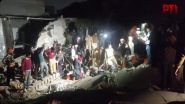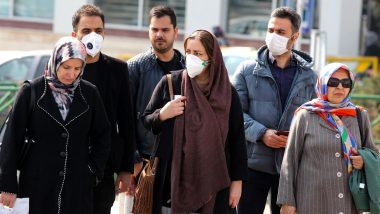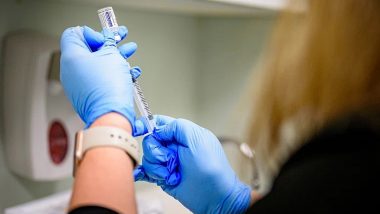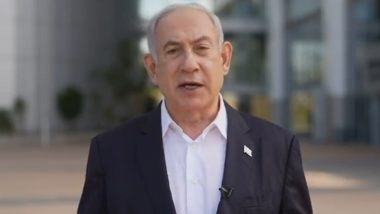Tehran, September 28: As Iran experiences the third wave of COVID-19, it has classified 32 provinces as red zones with the capital facing the most severe outbreak. As the country faces the worst Coronavirus outbreak in the Middle East, 195 new deaths were reported on Sunday, taking the total death count to 25,589.
On Friday, the number of daily infections escalated above 3,500 for the first time since the start of the pandemic in Iran in February this year and the number of deaths was above 200 for the first time in almost two months, Al Jazeera reported. Also Read | Why Azerbaijan, Armenia Are On Edge of Full-Blown War: Nagorno-Karabakh Dispute Explained.
Health ministry spokeswoman Sima Sadat Lari during her daily COVID-19 briefing announced that 3,362 more daily infections were registered, upping the total to 446,448. Hospitals are caring for 1,377 patients at the moment, Lari said. Also Read | Alexei Navalny, Russian Opposition Leader, Says ‘Very Grateful’ to German Chancellor Angela Merkel For Visiting Him at Berlin Hospital.
"Do not underestimate corona," Supreme Leader Ayatollah Ali Khamenei said in a live televised speech last week. Khamenei, along with President Hassan Rouhani has issued a direct warning for people to adhere to public health guidelines.
The President linked the rising number of cases to people not following the public health guidelines following which Khamenei remarked, "The solution for this is in our own hands," urging people to follow social distancing, wear masks and wash hands regularly among other public health guidelines. Rouhani in a televised meeting of the National Coronavirus Task Force last week said, "We need to assume this will last throughout the year, and even next year we might have to adhere to all these public health guidelines."
According to officials, Iran has joined COVAX, a global initiative aimed at working with vaccine manufacturers to provide countries equitable access to safe and effective vaccines once they are licensed and approved, said Al Jazeera. Iran further said it will buy 20 million doses of a vaccine made by an unnamed Indian company run by an Iran-born man.
"Even if we have access to a vaccine I believe we need to maintain this lifestyle," Khamenei added to his earlier statement to the televised meeting of the National Coronavirus Task Force.
The first appearance of COVID-19 in Iran was seen in February this year, after which the country was hit by a second wave in mid-summer during which the number of cases, hospitalization, and deaths had reduced.
President Rouhani on Saturday said a current proposal is under review to stop offering public services to people who refuse to wear masks and impose penalties for publicly defying the rules, without mentioning what the punishments might demand. Mandatory mask rule and potential penalties are also being considered by top officials.
Iraq has announced that it will not accept any pilgrims this year to further prevent the spread of coronavirus and Iranian authorities have requested people to celebrate upcoming religious occasions at home. "We will have no religious marches this year, we will have no pilgrimages to Iraq," Rouhani asserted at the end of the second month of the Islamic calendar.
Hadi Yazdani, a 38-year-old physician based in Isfahan who visits COVID-19 patients on a daily basis told Al Jazeera that it appears a partial reopening of schools and large public gatherings to observe mourning ceremonies in Muharram, the first month of the Islamic calendar, had an effect on the number of infections.
However, officials claim that Muharram gatherings were held in strict adherence to public health protocols and said that there is no proof that the reopening of schools contributed to the number of cases.
Yazdani, also a politician and a member of the reformist Union of Islamic Iran People Party said, "Imposing serious restrictions require a financial foothold, which has been destroyed by sanctions and mismanagement, but either way, there might even be a need for case-by-case quarantines for cities and provinces."
The US imposed harsh economic sanctions on Iran with the aim of crippling its economy after unilaterally abandoning a 2015 nuclear deal signed between Iran and world powers, which has delayed Iran's access to medicine and its foreign reserves, Al Jazeera wrote. In this regard, Iranian Foreign Minister Javad Zarif in a recent interview accused the US of "medical terrorism."
"Just as we criticize Iran for not allowing Medecins Sans Frontieres (MSF) in the country and our city Isfahan, we criticize the US government for imposing sanctions that have prevented Iran from accessing its financial resources and helping its people," Yazdani commented.
Yazdani concluded by saying, in a global pandemic there needs to be a global consensus on problem-solving. "We need to have an assurance that if a vaccine is produced, it will reach all people around the world, including our people who are under sanctions, and no country, government or company could use this as a tool to wield its power."
(This is an unedited and auto-generated story from Syndicated News feed, LatestLY Staff may not have modified or edited the content body)













 Quickly
Quickly




















